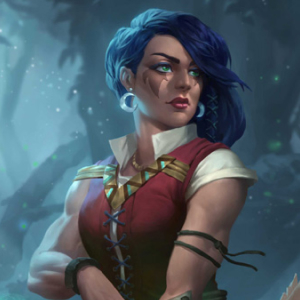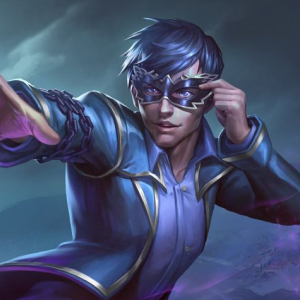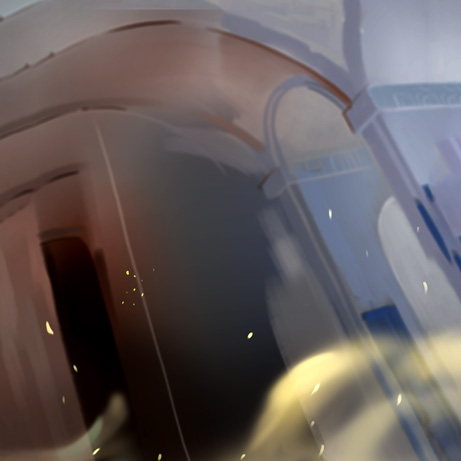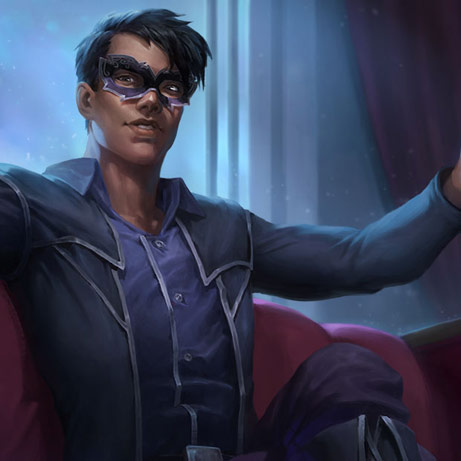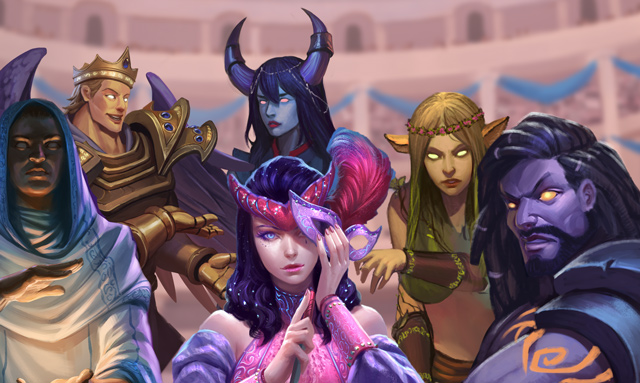It is difficult to describe the gods, and more difficult still to describe their Citadel. But I will try.
by Kelly Digges
Chapter 1: Citadel of the Gods
Present Day
It is difficult to describe the gods, and more difficult still to describe their Citadel. But I will try.
You’ve seen the statues of them in temples, of course. Incorruptible Thaeriel, cast in marble with his sword and circlet and wide-spread wings. Vengeful Auros, granite-carved and iron-clad, firelight glinting off his chain of broken crowns. Gentle Aeona, made of living wood, dressing herself for each season in turn. To mortal worshipers, the statues are the gods: terrible and beautiful.
These statues are the pale shadow of a blazing truth. Even when the gods themselves grace the surface of Eucos, they are but echoes—the greatest glory and power our little mortal world can host, but only echoes nonetheless.

Here, in the Citadel, one sees the truth of it: A god is an idea personified, a manifestation of one of the six domains of power that underlie the cosmos. Does Thaeriel wear a circlet in this place, in his truest form? Yes, but it is the halo of a sun-crowned mountaintop. He has wings, but they are cumulus clouds billowing across a turbulent sky. His sword is a ray of burning light. To look into his eyes is to stare into the sun, and be blinded. Even the choice of “he” or “she” is decided by historical convention more than literal fact.
And the Citadel! It is the highest of the Nine Realms, a place created by all six gods together as neutral ground. Here, their immense power can converge without worry of unwanted destruction, without interruption by the short-lived passions of mortals.
The floor is smooth stone, but it reflects things that are not present, and some that cannot be. Columns reach up into an infinite distance, supporting the sky above. Between the columns one glimpses other places—a hallway elsewhere in the Citadel from one angle, a storm-tossed sea from another, the Proscenium at Parthon from a third.

Great chains stretch at angles from the floor, vanishing between the columns. And past the columns are windows to the stars. The other Realms lie far below the Citadel, or so the scholars say. But here one looks straight out into the cosmos and sees them, each revolving slowly—around Eucos or around the Citadel, none can say. Only this place can house all the gods in their fullness without shaking to pieces.
The sight of one god inspires awe and terror. The sight of all six, together for the first time in mortal memory, in the seat of their splendor, is overwhelming. Yet here they are.
(I will use the present tense. No matter when you read this, or what has happened since, I cannot bring myself to write Thaeriel was. Gods are; it is their nature.)
In any case, let us hear what they have to say.
“My siblings, our wayward brother has returned at last!” booms Thaeriel, the God of Light. He shines from within, blazing down on Eucos with the proud heat of summer.

There is no applause, no commentary. They already know.
Elyrian, God of Magic, stands beside Thaeriel. He is hooded with night and robed in fog. His eyes are twin stars, distant and cold and brilliant. If he is looking at the others, it is only to peer through them, at things only he can see. He is the wayward brother, missing for centuries in the Great Chaos beyond the known realms, and he seems content to let Thaeriel speak for him.
Off to one side sits Aeona, God of Nature. The poets tell us, truthfully, that flowers bloom in her footsteps, and her smile brings life and laughter to the world. But today she is brooding. Dangerous. In Arkmonia far below, the Amazons find that their horses will not heed them, and great wolves howl in the woods.
“Welcome back, dear brother,” says Malissus, God of Death. Her voice is the whisper of wind over a lifeless desert, her skin the color of long-forgotten bones. “I shudder to think what would happen if I abandoned my realm for even a single year. How fortunate that your own domain spun on without you for hundreds.”
“If it couldn’t, I would not have left,” says Elyrian. Her tone does not seem to bother him.

Brooding Auros sits with Malissus, War and Death casually intertwined. Perhaps they are lovers, at the moment. (And lest that thought distress you, know that for all their talk of brothers and sisters, the gods are no more kin to one another than the tides are to the mountains.)
“Yes, welcome back!” yells Auros, and thunder echoes through the peaks of Kharkon. “Is that why you’ve called us here? To announce something we can all see as plainly as a daytime star?”
He gestures beyond the pillars, where a comet still blazes in the skies of Eucos. It was Elyrian’s chariot, bearing him home from the stars beyond the stars. Far below, the philosophers and sages still debate what it portends, ranging from the esoteric to the apocalyptic. Only one of them has guessed the truth, and they have not yet spoken it aloud.

Thaeriel smiles, but it is the cold, thin light of the sun shining through fog.
“The occasion deserves to be recognized,” says Thaeriel. But then he nods in acknowledgement. “That is not the only reason we are gathered.”
“An explanation, then,” growls Aeona, her eyes feral. “Elyrian, where have you been?”
The sixth god speaks at last, her words dripping with honey and malice.
“Yes,” says Ludia, the God of Deception, as a voice like steel and silk whispers No. “I’d say you owe all of us an explanation.”
The assembled gods begin to speak at once, a cacophony of conflicting energies. Children’s squabbles the world over suddenly turn ugly. In Tartessos, a man kills his brother, for reasons he will not remember later.
“I’ll admit I’m curious—”
“—don’t care what he was up to—”
“—abandoned us, abandoned me—”
Elyrian holds up a hand, and the gods fall silent. At his wordless command, the columns around them fall away, and the starry cosmos swells around them.

“What is the Great Chaos?” he asks.
Auros snorts like a bull. Aeona looks away. Malissus sighs heavily, the last rattling breaths of a hundred living things tumbling from her lips.
“They are not in the mood for sophistry, little brother,” says Thaeriel. “Tell them.”
“Very well,” says Elyrian. “You’ve all seen the Great Chaos. Felt it, beneath and around the other realms. You know that it eats away at form and structure. That what we call the cosmos is a bubble of calm in a vast sea of disorder with no apparent boundary.”
“So you say,” Aeona replies. “There is nothing beyond the cosmos. I knew this obsession would lead you astray!”
Elyrian continues as though she had not spoken.
“These facts are self-evident,” he says. “And, like many self-evident facts, they are incorrect.”
“It’s been so long,” says Malissus. “I’d forgotten just how boring you are when you’re declaiming.”
“There is order, beyond our realms,” says Elyrian. “The stars and constellations are proof enough of that. But there is far more out there. Patterns and echoes. I’ve been studying them, in the hopes of learning more about the cosmos, perhaps even about our own origins—”
“Enough!” says Thaeriel. “I told you, brother. They don’t care. It has always been your role to explore the limits of our understanding and the hidden truths they contain. The others care only for temporal things.”
Malissus scoffs at that, a sound like the bark of a hyena. Aeona snarls.

“Very well,” says Elyrian. “I shall keep my own counsel. I can’t say I’ve missed your collective indifference to my discoveries.”
“Is that it, then?” asks Ludia, as a voice whispers That’s all. “A family reunion and a lesson in cosmology?”
“No,” says Thaeriel. “I will show you the purpose of this meeting.”
Thaeriel’s eyes flare, and the starry cosmos recedes, replaced by a vast and gleaming arena. The sun beats down on it, as though they were far below, on Eucos.
Auros stands, and swords across Eucos loosen in their scabbards, eager for war.
“What is it?” asks Aeona.
“This is the Grand Arena,” says Thaeriel. His words ring out like a hammer on iron, indelibly fixing the name to the thing.
“Then we’re to fight,” says Auros, in a voice that seems torn between hunger and lust.
“No!” says Aeona. “The last time—”
“No,” says Thaeriel. “Never again.”
Malissus blows Thaeriel a kiss. The sun dims, just for a moment, and mortals across Eucos feel a sudden chill.

“Fah,” says Auros. “What, then? Shall we toss javelins and hold footraces?”
“This place will host a tournament,” says Thaeriel. “Each of us shall choose a mortal champion to embody our ideals and take on a portion of our power.”
“There is precedent,” adds Elyrian. “In the distant past.”
“Yes!” says Auros. “Yes. Another Demigods’ War!”
“There will be no war,” says Thaeriel. “Each champion will receive a trial—chosen by one god aside from their patron, subject to approval by the other four. Those who fail their trial fail the test.”
“What of those who succeed?” asks Ludia. Fail. “Do you plan to name a winner?”

“Fastest. Strongest. Most elegant. The answer will be obvious.”
“We will vote, if necessary,” says Elyrian.
“And what if we refuse to participate?” asks Malissus.
“It is your right to forfeit,” says Thaeriel.
“And why… this Arena?” asks Auros.
“The Grand Arena exists simultaneously here and on Eucos, so that we and our mortal champions may all attend.”
“A back door to the Citadel?” says Malissus. “You had no right.”
“That’s unnatural,” says Aeona. “It’s wrong.”
“It’s not a door,” says Elyrian. “More like… a mirror. To the mortals it is part of Eucos; to us it is part of the Citadel. That we will seem to stand together is an illusion.”
Thaeriel’s eyes flare again, and the Arena recedes, replaced by the Citadel.

“Your questions can wait,” he says. “Choose your champions, or forfeit.”
Thaeriel turns to Elyrian.
“Come. We have much to discuss.”
He spreads his wings and flies away, to some distant part of the Citadel.
Elyrian surveys the four remaining gods, his starlight eyes lingering on Aeona.
“It is good to be back,” he says, and then, in a swirl of mist, he too is gone.
Auros and Malissus lounge in one of the Citadel’s many galleries, looking out over the cosmos.
“I don’t like it,” rumbles Auros. It is night on Eucos, when warfare gives way to subterfuge and fire more readily yields to mortal will. At night he is less impetuous, more brooding.
“So you said,” replies Malissus. “Perhaps we should decline to participate.”
“But that might play right into his hands!” says Auros.
“He’s really not that deep,” says Malissus. “He may have hidden motives, but if he invited us it’s because he wants us to accept.”
“Then we should decline!” roars Auros, as pig fat drips into a thousand fires. “That will show him.”
“It was clever of him, though, to tie the contest to Eucos,” says Malissus. “If we refuse, we lose a chance for our champions to gain glory among the mortals.”
Auros grunts.

“I do like the thought of my champion knocking the sunny smile right off his champion’s face.”
“Of course you do,” says Malissus. “Maybe we should ask Ludia if—”
Aeona enters, and she is a great stag, a wild boar, the sudden fury of a summer storm. Antlers and tusks curl around her head, and she smells of blood and ozone and freshly turned earth. On Eucos, the night is thick and ominous, and people huddle close around their fires.
“Well, well,” says Malissus.
Aeona speaks, but it is the roar of a hungry bear, the howl of wind whipping the treetops, all anger and no sense.
“Always good to see your primal side,” says Auros.
“What’s troubling you?” asks Malissus.
Aeona breathes deeply. The storm subsides, though the air still crackles with pent-up anger.
“Elyrian,” she says.
Malissus moves aside, making room for Aeona between herself and Auros. Aeona sits.
“Go on,” says Malissus.
“We’ve always been close,” says Aeona. “When he focuses on real things—the magic of a dryad’s grove or a siren’s song—our domains overlap in harmony. Like yours do—or even yours and mine, Malissus.”
“But?” says Malissus.
“But he can never leave it at that!” says Aeona. “Elyrian and his philosophers debate whether motion exists, when all they need do is watch the rush of a waterfall or the bounding of a fawn. It’s maddening.”
“I know!” bellows Auros. “Makes you want to ram a spear right into their guts and ask them again if they believe in motion!”
Malissus glares at him, and he falls silent.
“He is obsessed with the idea that there’s something beyond the cosmos,” says Aeona. “I begged him to keep his attention here, on earth and sky and sea. On things that are real. I told him it was dangerous, that his prodding could unravel something vital. That perhaps the cosmos needs to remain a mystery, even to us. Maybe especially to us.”

“And?”
“Sometimes he listened. We strolled among the stars and planted sacred groves together. But more and more he didn’t. And then he was gone, vanished into his Great Chaos with barely a goodbye and no indication when he’d be back.”
“There’s nothing you could have done,” says Malissus. “It is his nature.”
“And now!” says Aeona. “Now he returns, talking more nonsense about the cosmos than ever. And who does he speak to?”
“Thaeriel,” says Malissus, and in her mouth it is an obscenity.
“Magic and Light, shining together,” says Aeona, the domains of the gods taking on strange harmonies. “I worry about the abominations they may illuminate, and the shadows they will cast.”
“You think the two of them are planning something,” says Malissus.
“That’s my fear,” says Aeona.

“We must stop them!” bellows Auros. He slams his fist on stone, and the stone cracks. Below, an earthquake rattles the desert sands of Thanakris.
“Yes,” says Malissus. “Do you think this contest is part of their plan?”
“That, or it is meant to distract us from their true plan,” says Aeona. “Maybe the contest is a ruse and the Arena is the key.”
“Enough second-guessing!” says Auros. “We will crush their trials. If they have plans beyond that, we will crush those too.”
“Then we’re agreed on this?” asks Malissus. “All three of us?”
Auros and Malissus look to Aeona. The moon hangs heavy in the sky.

“Agreed,” says Aeona, linking the three together with word and will.
Behind them, a shadow flits out of sight.
In another corner of the Citadel, far from the great windows on the cosmos, Thaeriel and Elyrian confer. It is night, when the sun hides and the stars shine. Thaeriel’s light is dimmed, his voice less resounding.
“The others don’t seem enthusiastic about this contest,” says Elyrian.
“We don’t require their enthusiasm,” says Thaeriel. “Only their compliance.”
“And what if they refuse?”
“They will not,” says Thaeriel. “They cannot allow our champions to stand before the people while they name no champions at all.”
“That makes sense,” says Elyrian. “But they are not always sensible. Auros in particular—”
“Auros is the most predictable of all,” says Thaeriel. “He speaks of chaos, yet yields to the same desires at every opportunity. He will fight, as surely as Ludia lies. Now then. The Arena.”
“It is ready,” says Elyrian. “I don’t think any of them have the understanding to deduce its true nature.”
“One does,” says Thaeriel.
“Ludia,” says Elyrian.
“Ludia,” says Thaeriel. The name is discordant, anathema to his nature.
He blazes with the full light of the sun, casting sharp shadows.
“She is here,” he says. “Show yourself, Ludia.”
Laughter drifts through the room, like the ringing of unseen chimes, as Ludia steps out from the shadow of a marble column.

The hint of a smile is visible behind her mask, but only to Elyrian. She hides her face from Thaeriel, because even she is not certain whether she can lie to him.
“Plotting without me, brothers?” she says. “You trespass in my domain.”
“Leave,” says Thaeriel. “Now.”
“‘All six gods shall travel freely throughout the Citadel,’” says Ludia. “That has always been the law.”
“Do not quote the law at me,” spits Thaeriel. “You ignore it when it does not favor you.”
“True,” says Ludia. “But you don’t.”
“What do you want, Ludia?” asks Elyrian.
“You two are hiding something,” says Ludia, “but you’re not very good at it, I’m afraid. Even our trusting little fawn Aeona can see it.”
“What of Aeona?” asks Elyrian.
“She’s furious with you,” says Ludia. “Auros and Malissus have welcomed her, and the three are united in opposition. Among other things.”
“That is not an answer,” says Thaeriel. “State your business.”
“I want to help you,” says Ludia.
Thaeriel’s eyes flare with sunlight, Elyrian’s with starlight, as they search for any sign of deceit from the God of Deception.
“Help us with what?” asks Elyrian. “Why?”
“With whatever it is you’re really trying to do,” says Ludia. “Because it is my nature, I suppose.”
“That is a lie,” says Thaeriel, and his words are as undeniable as a slab of granite. “You have ulterior motives.”
“Of course I do!” says Ludia. “That is my nature as well. But I do want to help you.”

“Truly?” asks Elyrian.
“That much is the truth,” says Thaeriel.
“Let me in on your little conspiracy,” says Ludia. “I can hide it better than you can, and the others will never suspect I’m helping you.”
“Swear that you will cooperate with our plans,” says Thaeriel. “Swear that you will tell no one, and that you will not work against us.”
“She can make no promise that we can trust,” says Elyrian.
“Swear it, Ludia,” says Thaeriel. “I will know if you are lying.”
“No, my dear,” says Ludia. “You’ll know if I’m telling the truth.”
“That which is not truth is falsehood,” says Thaeriel.
Ludia laughs.
“You poor thing. You really do believe that, don’t you?”
“Gods do not believe,” says Thaeriel. “I know. Now swear, or leave my presence.”
“Very well,” says Ludia, raising one hand in a mockery of a solemn oath. “Reveal your plan to me, and I swear not to reveal its existence nor its particulars to anyone, god or otherwise, nor to work at cross-purposes to your plans as revealed to me.”
“It is done,” says Thaeriel. With his words something settles into place, a link forged in a chain that will bind them both.
“Now then,” says Ludia. What’s this all about?”
“I learned a great deal, out in the darkness,” says Elyrian. “About the nature of this cosmos. And, more to the point, about the fate of the creations that preceded it.”
Ludia’s presence seems to grow, to fill the little room, as she inhales the heady scent of a true cosmic secret.
“Preceded…” she breathes. “Then our memories of the creation, of how all this came to be, they are… false?”
“They are accurate,” says Elyrian, “but incomplete. There are echoes, out there in the darkness. Patterns. These patterns suggest that there were… other acts of creation. Other gods, whom we do not remember.”

These words rip through the amber air of the Citadel, screaming and howling at their own unspeakable truth. Ludia shies from them. Even Thaeriel winces. In a gallery across the Citadel, the trio of gods do not notice, their attentions consumed with sealing their covenant. But across Eucos, among those beings whose minds are open to the truth—children, artists, sages, animals—a few cry out in their sleep, aware that something, somewhere is wrong.
Ludia moves her mask aside, and she is no longer smiling.
“Tell me everything.”
Kelly Digges is a narrative designer and creative consultant for games, with 90 credits across more than 50 products for Magic: The Gathering and other games. Find him on Twitter at @kellydigges.
































